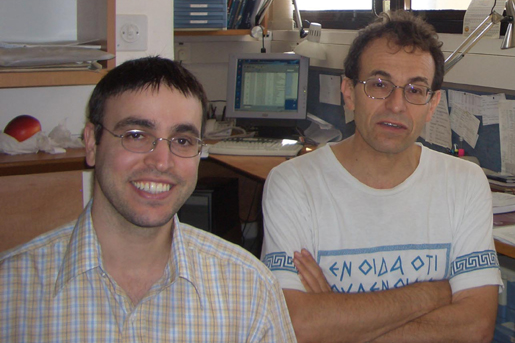Guest of the section: Dr. Hussam Haik, Department of Chemical Engineering, Technion "At the Weizmann Institute, we operated right at the edge of the frontier of knowledge. Every day we discovered something we didn't know yesterday. It was a wonderful adventure"

Dr. Hussam Haik's romance with the world of small things began when he was 12 years old. "Even as a child I loved rummaging through the bookshelves in my father's library," he says. "One time I found a book about the structure of the atom. The mystery of science attracted me even then, even before I knew words like physics and chemistry." That first book was followed by many more books. "I learned a lot on my own, and I was always looking for the smallest dimensions, the smallest unit that you can work with." Today, twenty years later, the boy who was interested in the structure of the atom is a promising researcher at the Technion, in the fields of nanoelectronics and molecular electronics. In his laboratory, in the chemical engineering department, he focuses on the development of tiny devices and sensors based on nanomaterials.
As in many other cases, Dr. Haik's basic research also led him towards applications that could not have been foreseen at the beginning. In this case, research that began in the "jurisdiction" of physics and chemistry led him to the world of medicine. The inhaler he is developing is based on an array of unique nano-sensors, the data they collect are analyzed using mathematical algorithms. In this way, the entire system is able to sense and identify molecules floating in the air, similar to the way the human sense of smell works, and may detect tiny amounts of characteristic substances secreted by cancer cells. In this way, it will be possible to diagnose the early stages of a cancerous disease, when the cancerous tumor includes only a few cells. "This is a non-invasive test," says Dr. Haik, "and its results are obtained in real time, within a few minutes." The invention won Dr. Haik the prestigious scholarship named after Marie Curie in the amount of 1.7 million euros, which joined many other awards already under his belt.
The inhaler for cancer diagnosis is one of a series of sensors based on nanomaterials that Dr. Haik is developing. Other sensors he is developing may be used for environmental monitoring, identifying dangerous substances, ensuring the quality of food and medicine, and more.
Following his interest in nanoelectronic devices based on organic molecules, Dr. Haik embarked on post-doctoral research in the laboratory of Prof. David Kahn in the Department of Materials and Surfaces at the Weizmann Institute of Science. Two years of research in this framework, and additional postdoctoral research at the California Institute of Technology, led him to combine basic research with application development. "I came to the Weizmann Institute from a technological background, and I acquired a scientific way of thinking there," he says, "and today I combine these two aspects - both a researcher and an inventor. In Prof. Kahn's group, we were working right at the edge of knowledge. Every day we discovered something we didn't know yesterday. It was a wonderful adventure. David did everything possible to remove any obstacle from our path and allow us to work without interruption, and without delays and postponements." The relationship between the two continues even today, and led to joint research by Dr. Haik with Dr. Lior Kronik, from the Department of Materials and Surfaces at the Institute.
Throughout his career, Dr. Haik was involved in the guidance and mentoring of students, both in his hometown of Nazareth, and in the research institutions where he studied and worked. "It's important to me to contribute to the society where I grew up and was educated," he says, "and that's why I see my future at the Technion - a world-renowned institution that supports the connection between science and medicine, which also allows me to stay in the environment where I grew up, and close to my family."

5 תגובות
I listen to lectures on nanotechnology at the People's Cathedral in Kiryat Ono. I pray for you. Good luck.
I thought that after the degree you don't need to bother with math anymore..
What a drag.
Very nice! strength
Align power.
Beauty! strength